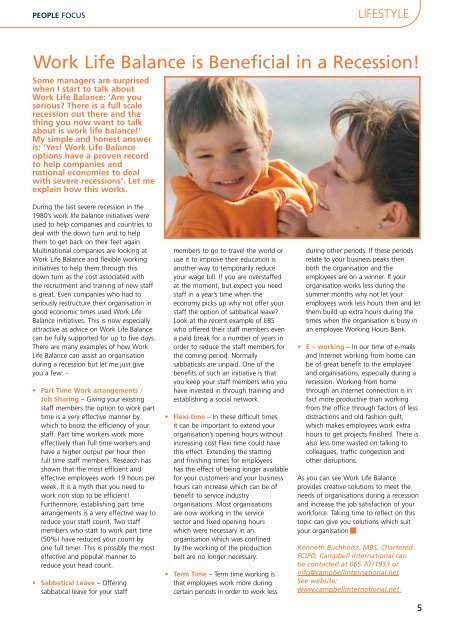PEOPLE FOCUS - CIPD
PEOPLE FOCUS - CIPD
PEOPLE FOCUS - CIPD
Create successful ePaper yourself
Turn your PDF publications into a flip-book with our unique Google optimized e-Paper software.
<strong>PEOPLE</strong> <strong>FOCUS</strong><br />
LIFESTYLE<br />
Work Life Balance is Beneficial in a Recession!<br />
Some managers are surprised<br />
when I start to talk about<br />
Work Life Balance: ’Are you<br />
serious? There is a full scale<br />
recession out there and the<br />
thing you now want to talk<br />
about is work life balance!’<br />
My simple and honest answer<br />
is: ‘Yes! Work Life Balance<br />
options have a proven record<br />
to help companies and<br />
national economies to deal<br />
with severe recessions’. Let me<br />
explain how this works.<br />
During the last severe recession in the<br />
1980’s work life balance initiatives were<br />
used to help companies and countries to<br />
deal with the down turn and to help<br />
them to get back on their feet again.<br />
Multinational companies are looking at<br />
Work Life Balance and flexible working<br />
initiatives to help them through this<br />
down turn as the cost associated with<br />
the recruitment and training of new staff<br />
is great. Even companies who had to<br />
seriously restructure their organisation in<br />
good economic times used Work Life<br />
Balance initiatives. This is now especially<br />
attractive as advice on Work Life Balance<br />
can be fully supported for up to five days.<br />
There are many examples of how Work<br />
Life Balance can assist an organisation<br />
during a recession but let me just give<br />
you a few: <br />
• Part Time Work arrangements /<br />
Job Sharing – Giving your existing<br />
staff members the option to work part<br />
time is a very effective manner by<br />
which to boost the efficiency of your<br />
staff. Part time workers work more<br />
effectively than full time workers and<br />
have a higher output per hour then<br />
full time staff members. Research has<br />
shown that the most efficient and<br />
effective employees work 19 hours per<br />
week. It is a myth that you need to<br />
work non stop to be efficient!<br />
Furthermore, establishing part time<br />
arrangements is a very effective way to<br />
reduce your staff count. Two staff<br />
members who start to work part time<br />
(50%) have reduced your count by<br />
one full timer. This is possibly the most<br />
effective and popular manner to<br />
reduce your head count.<br />
• Sabbatical Leave – Offering<br />
sabbatical leave for your staff<br />
members to go to travel the world or<br />
use it to improve their education is<br />
another way to temporarily reduce<br />
your wage bill. If you are overstaffed<br />
at the moment, but expect you need<br />
staff in a year’s time when the<br />
economy picks up why not offer your<br />
staff the option of sabbatical leave?<br />
Look at the recent example of EBS<br />
who offered their staff members even<br />
a paid break for a number of years in<br />
order to reduce the staff members for<br />
the coming period. Normally<br />
sabbaticals are unpaid. One of the<br />
benefits of such an initiative is that<br />
you keep your staff members who you<br />
have invested in through training and<br />
establishing a social network.<br />
• Flexi-time – In these difficult times<br />
it can be important to extend your<br />
organisation’s opening hours without<br />
increasing cost Flexi time could have<br />
this effect. Extending the starting<br />
and finishing times for employees<br />
has the effect of being longer available<br />
for your customers and your business<br />
hours can increase which can be of<br />
benefit to service industry<br />
organisations. Most organisations<br />
are now working in the service<br />
sector and fixed opening hours<br />
which were necessary in an<br />
organisation which was confined<br />
by the working of the production<br />
belt are no longer necessary.<br />
• Term Time – Term time working is<br />
that employees work more during<br />
certain periods in order to work less<br />
during other periods. If these periods<br />
relate to your business peaks then<br />
both the organisation and the<br />
employees are on a winner. If your<br />
organisation works less during the<br />
summer months why not let your<br />
employees work less hours then and let<br />
them build up extra hours during the<br />
times when the organisation is busy in<br />
an employee Working Hours Bank.<br />
• E – working – In our time of e-mails<br />
and Internet working from home can<br />
be of great benefit to the employee<br />
and organisations, especially during a<br />
recession. Working from home<br />
through an internet connection is in<br />
fact more productive than working<br />
from the office through factors of less<br />
distractions and old fashion guilt,<br />
which makes employees work extra<br />
hours to get projects finished. There is<br />
also less time wasted on talking to<br />
colleagues, traffic congestion and<br />
other disruptions.<br />
As you can see Work Life Balance<br />
provides creative solutions to meet the<br />
needs of organisations during a recession<br />
and increase the job satisfaction of your<br />
workforce. Taking time to reflect on this<br />
topic can give you solutions which suit<br />
your organisation ■<br />
Kenneth Buchholtz, MBS, Chartered<br />
F<strong>CIPD</strong>, Campbell International can<br />
be contacted at 065 7071933 or<br />
info@campbellinternational.net<br />
See website:<br />
www.campbellinternational.net<br />
5

















